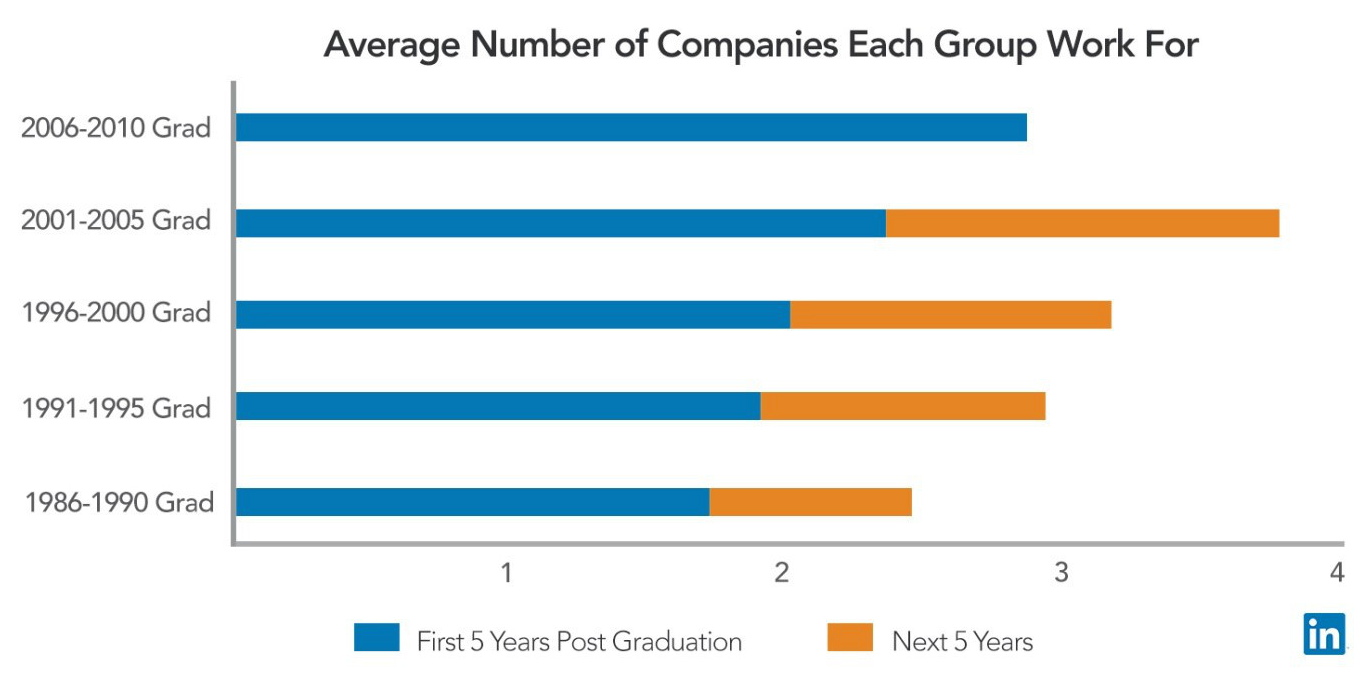Digitalisation is having an enormous impact on the workplace. Not only is it changing the way that work is organised and contracted, but it is also having a fundamental effect on skills-sets and the types of work available.
The landscape of work is shifting fast and is far more diverse than even just ten years ago. Advances in the economy and technology mean that today the physical location of work is less and less important. Work is less a place to go than a task to be completed. Nowadays workers have a variety of work options – and they are taking advantage of them. The idea that you commute to and from an office every day and sit at a desk for eight hours is no longer the only choice.
Millennials particularly are embracing this more flexible way of working and job-hopping has become more widespread. In the US, the number of companies that a young person will work for in the first five years after they graduate has almost doubled in the past 20 years. People who graduated between 1986 and 1990 averaged more than 1.6 jobs in the subsequent five years while those graduated between 2006 and 2010 average nearly 2.85 jobs. For today’s young people as long as they have a laptop and an internet connection they can work pretty much anywhere.
In short the way in which work is sourced, undertaken and paid has evolved far beyond theconfines of the industrial age with its job-for-life and a gold watch on retirement.
Nowadays labour markets feature a wide diversity of labour contractual arrangements. This increases both labour participation and inclusion. People work on projects, sometimes from home and sometimes in a team, and they navigate between a range of different contractual forms of work including freelance, project based, part-time and fixed-term contracts.
While digitalisation is changing the way that we work, it is also having a profound effect on the skills we need and the types of job available, and a truly brave new world is just around the corner. By 2020 artificial intelligence, robotics and machine learning will be deeply embedded in our everyday lives – just like smartphones and computers are today.
We have witnessed the impact of automation for over a decade now with self-service in supermarkets, banks and at airport check-in’s no longer even worthy of comment. People are being replaced by machines – and it’s not just in low-skilled jobs. Wall Street has shed 30% of its staff in the past five years thanks to automation. In the future, pretty much all of us will be affected to some degree by automation – from journalists and lawyers through to tax consultants and technicians. Companies like Whatsapp for example, service 900 million users with just 50 highly tech-savvy engineers.
What is really happening here is that job roles are disappearing and being replaced by skill sets. If you ask organisations what they are looking for most in talent they will reply: skills – and IT-related digital skills in particular.
Digital skills are a fundamental to succeed in today’s labour market. Employers need a workforce with ever-changing skills that keep pace with new developments and technology. At present we risk a digital skills gap in both mid-skill and high-skill jobs and we must ensure that workers keep their skills up-to-date and relevant. While we cannot predict exactly how the job market will develop in the years to come we do know that it will require a constant renewal of skills.
Of the 25 top skills required in the world today 35% are related to software development – of which 20% are IT infrastructure related and 15% focused on data analytics. So the future is rosy for those who master computer science and governments must ensure that these skills are built into our education systems so that youngsters leaving school are equipped with the competences that the job market needs.
However, it’s not just computer skills that are needed. In today’s digital world soft skills are also very important. Critical thinking and analytical reasoning are aptitudes that are in growing demand. Emotional intelligence, thinking outside of the box and the ability to interpret and create meaning from data or what is being expressed will be key in the workplace of the future.
So how can governments, employers and labour market enablers work to ‘futureproof’ the workforce? We need to take a new approach to skills and lifelong learning. Employability needs to become a constant priority for everyone. We must adapt and recognise that lifelong learning and new skills training need to be a part of everyone’s job description and available to all.
The recently published World Employment Confederation Manifesto calls for skills for jobs in order to equip workers to succeed in a fast-changing labour market. It highlights access to education for adults and flexible on-the-job training as essential for all workers regardless of age, sector or education level.
Reskilling and upskilling should become a regular occurrence throughout a person’s working life and governments would do well to set up individual training portfolios for all workers – whatever their contractual work relationship. We need to act now, because the future of work is already here.
Denis Pennel
Managing Director, World Employment Confederation

